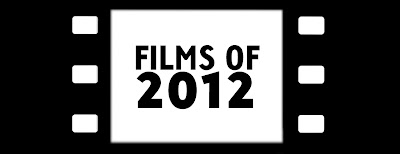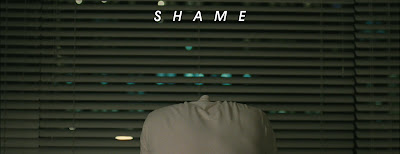The following, in alphabetical order, are my favorite films of 2012.
If Giorgos Lanthimos' fourth film (his second to reach Stateside) isn't quite the jolt that his previous film, Dogtooth, a film that more and more seems like the Breathless for the New Greek Cinema, was, it's not for lack of trying. Like Dogtooth and compatriot Athina Rachel Tsangari's Attenberg, this is an audacious, strange, potently emotional film. Essentially following a small group who are paid to fill in the roles in families left by the recently deceased, Lanthimos finds odd corners and indulges in the same kind of games, dances and outbursts of violent emotion that his characters did in Dogtooth. It's fascinating to watch, and as you unpack the unpredictable emotional terrain Lanthimos treads in, it becomes a powerful one too.
The Palme d'Or winning entry from Michael Haneke is less austere than his previous (also Palme d'Or winning), nearly perfect The White Ribbon, but though it flirts with a more conventional film making style than Haneke has employed before (one unfortunate dream sequence looks like it could be out of Mirrors), it retains Haneke's emotional detachment, with a denouement worthy of Haneke's notoriously cold, isolating career. The bulk of the movie is reliant on the performances of two French film icons, Jean-Louis Trintignant and Emmanuelle Riva. It's a rare and great opportunity to see such great actors at such an advanced age give such strong, emotionally complex performances. It's their work, particularly Trintignant, that keep the course of the film from meandering into more maudlin territory.
Six years after the first rush of so called Romanian New Wave films in 2006, one would not be wrong to wonder if the movement had been merely a flash in the fickle international film scene's pan. It seemed as if in the years following the Palme D'Or win of Cristian Mungiu's 4 Months, 3 Weeks and 2 Days, the once flourishing movement was already in its last breaths, so it's reassuring to find, five years after that triumph, Mungiu return to feature film making with an enlivened voice. Though retaining the Romanian penchant for long, static takes, Mungiu treads in territory one is more likely to find in early Bergman or Rossellini. Set in a snowy monastery in the hills, Mungiu's film tackles the necessity and extremes of religious devotion and ritual, and particularly the role of spiritual leaders as arbiters for morality and justice. It is a strangely objective film, considering the horrors within, but as with the best of this nascent movement, its surface objectivity allows for a far more devastating effect. By showing the natural progression of events, and the consequences of them, Mungui illuminates the more bleak aspects of humanity in a way few other filmmakers outside of Bresson are capable of doing.
Alex Ross
Perry's second film is at once a sloppily put together comedy, and also
perhaps the most important rallying call for American independent
cinema. Shot on 16mm black and white, Perry eschews the easy, often
hermetically tinkered over digital cinema that makes up a majority of no
budget film making these days in favor of a mistake filled, accident
prone, meandering road movie that offers none of the familiar beats of a
road movie and is at often times aggressively unfunny in a purposeful
way. Perry and co-writer Carlen Altman are to be credited with the
subtle telegraphing of the film's conclusion, which on the surface might
seem like an arbitrary shock, but is actually tightly woven into the
fabric of the film from the first minutes. The film is very funny
though, and even it's unexpected conclusion doesn't alter mordantly
funny, misanthropic tone of the film.
An aching film, part tragic romance, part elegy for a long forgotten England. Centered on two wonderful performances from Rachel Weisz and Tom Hiddleston, Terrence Davies' film offers nostalgia without sentimentality, a kind of outre, less poised version of Atonement. Aesthetically, Davies always seems to flirt with the subtly avant-garde, and that pervades the screenplay too, adapted from Terrence Rattigan's play. Nearly nothing the characters say is what they mean, but the stellar cast communicates the internal lives of the characters so well that its as if a separate screenplay is being read in their faces, their posture, their movement. It's a devastating film.
By no means the out and out masterpiece that Inglorious Basterds is, Quentin Tarantino's seventh film continues his streak of unwavering quality. Essentially his take on a revenge movie/western, it hits a lot of the familiar Tarantinian beats, but with dialogue so enjoyable delivered so wonderfully, it's hard to complain. It also features some of Robert Richardson's most beautiful work behind the camera, and more than a few delightful monologues by Christophe Waltz, an actor perfectly suited to Tarantino's world. There is a difference, both in pace and tone from the rest of Tarantino's work, which I think can be attributed to this being the first film he's made without the late Sally Menke, a collaborator as integral to his work as Schoonmaker is to Scorsese's.
On
my first viewing of the Dardenne brothers' seventh feature at the 2011
Chicago International Film Festival, I took it as perhaps their lightest
work, I thought they'd gone soft, providing the kind of easily
marketable personal drama they'd so long avoided (hell, they even had a
score, albeit a sparsely used, small snippet of a Beethoven piano
concerto), and casually wrote it off as a disappointment. But when the
film came out that following Spring I revisited it, and what I found is
perhaps one of the strongest films the Belgian duo has made. Every
gesture of the film is centered on the confused, frightened face of
Cyril (Thomas Doret), and if the Dardennes are less hard on him than
their other protagonists, it's because that face demands a more gentle, sympathetic
touch. Few filmmakers are able to invest you so strongly in characters,
particularly ones you may find irredeemable at points, but they invest
you here, perhaps deeper than they ever have.
Yes,
the running commentary of the 2008 election is unnecessary, yes, using
"Heroin" during a scene where characters take heroin iss too on the nose by about a thousand,
and yes that final speech is clunky and doesn't deliver the kind of
astonished wallop you know Andrew Dominik envisioned when he was writing
it. So why is this one of the best movies of the year? Flawed though it
may be, no one took more chances aesthetically on what is largely a
crime movie. There's a hell of a lot more to it than just the crime
plot, and even putting aside the political parallels throughout, it's a
movie of tone. Tone of conversation, of rooms, of movement of the
camera, of sound, of picture. It's pure movie-making and it's a god damn
thrill to watch.
That a movie centered around a male stripper has far more in commong with '70s character studies like Serpico, and Five Easy Pieces
than a fireman's calendar is entirely owed to Steven Soderbergh. With
his continuously adventurous camera work (serving as his own DP again,
Soderbergh busts out what is now a new trademark, the unmotivated pan,
it's as if his camera is looking around his story, seeing if there's
anything more interesting elsewhere), and natch for finding interested
ways of exploring pretty boring people in a fascinating way, he's made a
movie that is at once entirely familiar and feels quietly thrilling.
After starting out the year with the great, underrated Haywire,
Soderbergh delivered a small-scale summer blockbuster that is by turns a
somewhat seedy character study, a romance, and a non-preachy comment on
the capitalist, enterprising American Dream. Most of all it's incredibly fun.
It's
daunting, even in short, to try and talk about Paul Thomas Anderson's
sixth film. Part of this is that the film, by its nature, announces
itself as an event. From the opening shot of the ocean, seen in crisp
70mm through Mihai Malaimare Jr.'s camera, a striking immediate
representation of the vastness this film will encompass. Anchored by a
slew of great film performances, perhaps most especially the one by
Joaquin Phoenix, incredibly dense production design, great sound,
stunning images, it's a film of a higher class in its making than most.
But when you combine all of these elements you're left with a film of
ideas, and it's those ideas, identity, death, love, purpose, etc. that
are hard to talk about. Few filmmakers tend to top themselves with each
successive movie so thoroughly and surprisingly as Anderson, but, with The Master, he has. This is the best film of the year.
Taking what he learned making the wonderful Fantastic Mr. Fox,
Wes Anderson applies that miniaturized, controlled mode of film making
to his return to live action. Anderson's first overt period piece is
both a funny, touching portrait of a community, and a tender, nostalgic
story of young love. Working for the first time on super 16mm, Anderson
embraces not only the 1960s period music and clothes, but also its film
aesthetic, fusing it with his own distinctive style to make another
great Wes Anderson film.
What
an odd film. It is, in some respects, a barebones adaptation of Emily
Bronte's much adapted novel, naturalistic to the extreme, but it's
really far more avant-garde than that. It's a film textures, of wind, of
wheat and grass and wood and dirt and cloth and hair and heartache.
It's almost as if Andrea Arnold was able to reach into the English
countryside and pull out all of the longing and pain and anger from its
muddy, overcast hills and put them on film. A truly staggering film.

















































